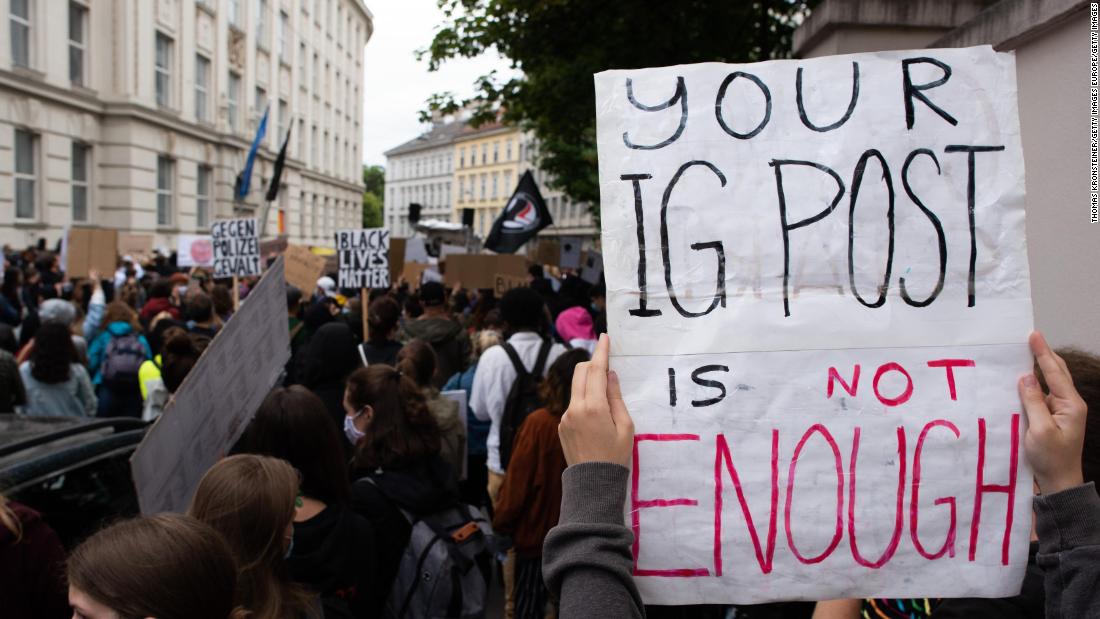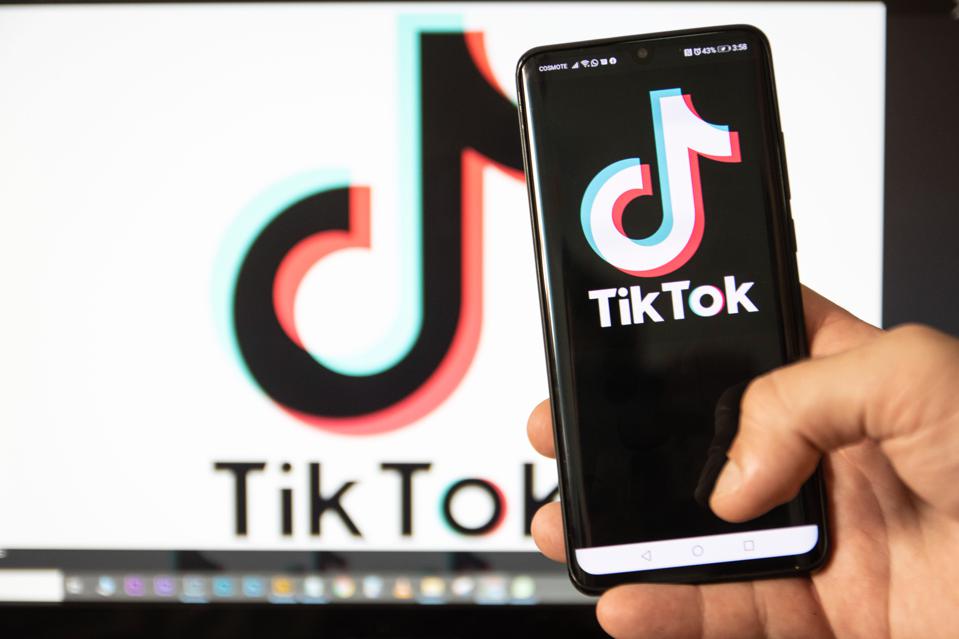Since May 26, headlines have been dominated by the killing of George Floyd and the international protests it has ignited. Thousands have taken to the streets around the world to denounce police brutality and anti-blackness, while online, thousands more have posted en masse in support of #BlackLivesMatter (BLM) and called for an end to systemic racism.
On social media, many fashion brands were quick to align themselves with protesters, posting black squares to Instagram on #BlackoutTuesday, and sharing lengthy captions denouncing racism, discrimination and violence. But not everyone was buying it.
“Plain and simple, I don’t think there is the intention behind it to make long-lasting, sustainable change,” Teen Vogue editor-in-chief Lindsay Peoples Wagner said in an email to CNN. “Everyone can hop onto the BLM movement right now on social media, but what are you doing in your home, in your corporate office, with your connections, with the power you have?”
Wintour, whose official title names her as artistic director and editor-in-chief of Vogue US and global content advisor, sent an internal email to her staff on June 5. In the memo, seen by CNN, she acknowledged and took “full responsibility” for the racism that flourished under her watch: “I know Vogue has not found enough ways to elevate and give space to Black editors, writers, photographers, designers and other creators. We have made mistakes too, publishing images or stories that have been hurtful or intolerant,” she wrote.
Additionally, a spokesperson for Condé Nast, Vogue’s publisher, said in a statement, “Condé Nast is focused on creating meaningful, sustainable change and continues to implement an inclusive hiring process to ensure that a diverse range of candidates is considered for all open positions.”
“Everyone can hop onto the BLM movement right now on social media, but what are you doing in your home, in your corporate office, with your connections, with the power you have?”
Lindsay Peoples Wagner

Teen Vogue editor-in-chief Lindsey Peoples Wagner Credit: Kyleen James / The Society Management
“My focus has not been on fashion; my focus has been on lives being lost and the injustice (facing) Black people,” Bolden said in a phone interview. “But in that particular moment when I saw that go across my feed, it just sparked my rage. It just felt like a joke to me. It didn’t feel authentic.”
As a stylist, Bolden said he’s often felt marginalized by high fashion brands. He recalls struggling to find a designer to dress Henson for the 2017 Academy Awards, where her film “Hidden Figures” was nominated for three awards, including Best Picture. “These are the exact same brands that I would see dressing talent who no one had ever heard of, and they were all White girls,” said Bolden.
“And in those moments, what else are you supposed to lean into? (Henson) has everything they could possibly want. She has the press that goes along with (the Oscar nominations), she has the major coverage, she’s presenting, she’s won a Golden Globe… she’s in critically acclaimed movies. And yet they said no.”
“But in that particular moment when I saw that go across my feed, it just sparked my rage. It just felt like a joke to me. It didn’t feel authentic.”
Jason Bolden

Stylist Jason Bolden
“I think what we’re seeing is people like myself who are tired of people and brands not walking the talk,” said Peoples Wagner. “It’s very easy for people to tap into a moment and say they care about an issue, but people have been doing that for years without making real systemic changes, and that’s what’s being demanded of brands now.”
Having walked the runway and fronted campaigns for some of the world’s most renowned luxury brands and appeared on the April 2020 cover of Vogue, Aighewi said she sees her “entire career” as part of the industry’s recent — if still limited — efforts to increase model diversity in magazines and on the runway after years of criticism. “Literally everything that I’ve done has been as the face of my race and as a diversity token. I shot the cover of American Vogue in December, and yet I don’t see any of the companies that so proudly paraded me around having meaningful dialogue about Black Lives Matter.”
Danielle Prescod, style director for BET.com, wasn’t surprised to see brands suddenly speaking up against racism in the aftermath of Floyd’s killing. “(With) something that was moving as quickly as this movement was through social media, it would have been so glaring if people didn’t say anything,” she said.
“Literally everything that I’ve done has been as the face of my race and as a diversity token.”
Adesuwa Aighewi

Model Adesuwa Aighewi Credit: Kyleen James/The Society Management
However, she couldn’t help but question the motivation when brands that had previously remained silent on issues of race, or hadn’t previously prioritized inclusion and diversity, chose this moment to speak up.
“It does come across as disingenuous when a brand says something like ‘We stand with the Black community.’ It’s like, when have you ever stood with the Black community?” she said. “You have had the same opportunities to defend Black lives, to defend Black beauty, to employ Black people from the onset of your business. So for you this week to decide that you do (care about Black lives) is all too convenient. It ends up looking like a marketing opportunity rather than something that they truly care about.”
Indeed, now more than ever, aligning one’s brand with popular causes can make for good strategy. According to the 2020 State of Fashion Report, compiled by management consulting giant McKinsey & Company and trade publication the Business of Fashion, almost two-thirds of consumers identify as “‘belief-driven buyers’ who will choose, switch, avoid or boycott a brand based on its stand on societal issues.” Because of this, the report predicted that more companies will “elevate diversity and inclusion as a higher priority.”
“If you look at how brands rally around causes, it’s usually popular causes and the causes of the majority, because what you’re trying to do is align your brand with customer values. So you now have a customer who judges your brand not as an entity, but as a person or personality,” said Martin Raymond, co-founder of trend-forecasting consultancy The Future Laboratory.
“Traditionally, it was useful for brands to sit on the fence but, increasingly, if you sit on the fence, you risk getting splinters on your bottom. You end up not really understanding the pendulum of history and where it’s swinging, and where you need to be when that pendulum passes over you.”
However, by aligning themselves with a cause, brands open themselves up to increased consumer scrutiny and criticism, which can be problematic when their pledges contradict their practices. Raymond points to the ongoing conversations around fashion brands’ sustainability efforts, which have often been panned as “greenwashing”: “If I examined your infrastructure, your logistics chain or your sourcing — particularly in fashion — I would find quite strange things sitting there that would be readily available for criticism and for challenge.”
However, Bethann Hardison, a former model, turned modeling agent and diversity advocate, is less cynical. “When people offer their solidarity, I don’t tend to question it… I don’t have time for that. We have a movement to keep moving,” she said.
“These big companies, a lot of them are very good people and they do care to do the right thing, but they’re used to being who they’ve been. Now, this is an opportunity for people to wake up and look and notice that something different is happening around them and happening to them.”
For brands who, historically, haven’t had to think critically about race and social justice — or address the issues of racism in their own teams — a learning curve is to be expected. “Some people are being challenged for the first time to talk about race openly.”
“When people offer their solidarity, I don’t tend to question it… I don’t have time for that. We have a movement to keep moving”
Bethann Hardison

Model Bethann Hardison Credit: Jacopo M. Raule/Getty Images for Gucci
Some brands have been better at establishing solidarity than others. Bolden has praised Valentino designer Pierpaolo Piccioli for his multicultural casting and for making South Sudanese-Australian model Adut Akech the de facto face of the brand. Similarly, Prescod commends plus-size luxury e-retailer 11 Honoré for its commitment to using diverse models on their platform and on Instagram. (“You won’t go two scrolls without seeing a Black face,” Prescod observed.)
“People have been saying for years the steps that need to be taken: create a pipeline for BIPOC (Black, Indigenous and people of color) talent, make sure that pipeline gives way for leadership positions so you don’t just have a ton of BIPOC assistants and freelancers, etc.,” Peoples Wagner said. “Inclusivity isn’t as hard as people make it seem. It just has to be a committed, company-wide decision, and not a choice unilaterally.”
Aighewi is similarly optimistic but acknowledges that genuine change won’t come easily. “People need to actually do the work: get uncomfortable, have these conversations, admit that the system is not correct,” she said.
“These companies have been around long enough. This is not the first time Black people have complained about the fashion industry; this isn’t the first revolution. Something’s got to give.”
[ad_2]




